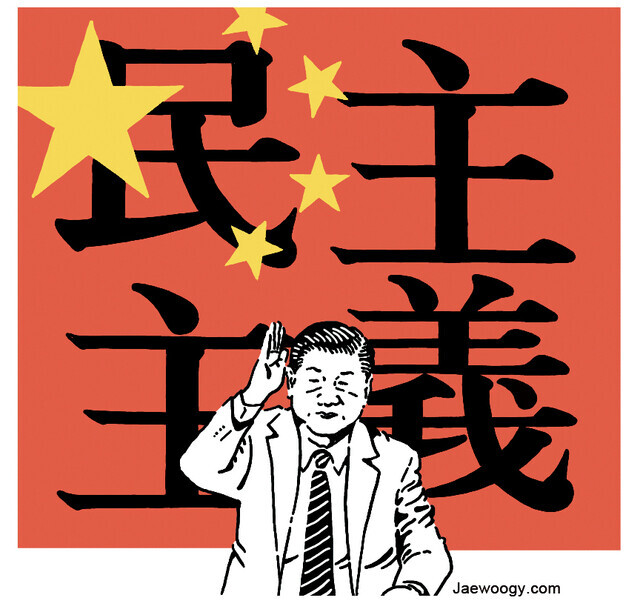hankyoreh
Links to other country sites 다른 나라 사이트 링크
[Column] What China means by “democracy”

In an era when democracy has been on the decline around the world, the debate over what the word actually means has been heating up.
In response to US President Joe Biden’s administration calling together 100 countries for its Summit for Democracy on Dec. 9 and 10, China has been waging a large-scale propaganda campaign stressing the superiority of “China’s democracy” in a Dec. 4 white paper titled “China: Democracy That Works” and a Dec. 5 report on “The State of Democracy in the United States.” This is no longer the China that went on the defensive every time the US raised issues about its democracy and human rights situation.
What exactly is “China’s democracy”? In its “Democracy That Works” white paper, China stressed that it is practicing “whole-process people’s democracy.”
“If the people are awakened only to cast a vote but become dormant afterwards, that is no true democracy,” the report says of Western democracy. The one-party Communist rule in China, in contrast, is “whole-process people’s democracy” that “ensure[es] that the people’s voices are heard and their wishes are represented in every aspect of China’s political and social life.”
Noting the severe divisions in US politics and the attack on the US Capitol carried out by Donald Trump supporters in January, the report criticizes US democracy as beholden to financial interests, with a “One Person, One Vote” election system that has transformed into a form of politics dominated by a small elite.
In contrast, it lauds Chinese politics as a perfect form of democracy.
The reason China is so loudly proclaiming the superiority of Chinese democracy seems first to have to do with pushing back against US efforts to beef up its alliances for keeping China in check, adopting a frame pitting “democracy” against “authoritarianism.”
In terms of domestic politics, it also signals an attempt by President Xi Jinping to rally support among his patriotic public as he gears up for a long term in power, speaking out against the US at a time when China’s economic growth has slowed, and inequality remains severe. This is reminiscent of the Park Chung-hee regime’s emphasis on “South Korean democracy” when it proclaimed the Yushin constitution in 1972.
An even more noteworthy aspect of this “Chinese democracy” push is that it isn’t just defensive in nature.
Xi first proposed the “whole-process people’s democracy” ideas during an inspection of Shanghai in November 2019. Around 2016, he had already begun criticizing “universal values” and emphasizing confidence in the Chinese models of systems, courses, ideology and culture.
In 2018, he declared a “once-in-a-century upheaval,” referring to the arrival of a strategic opportunity for China to surpass a US whose power was on the wane. Against this backdrop, he worked to create a frame pitting the US model of democracy against Chinese democracy.
In his recent summit with Biden, Xi described democracy as “rich and diverse,” insisting that there is no universal model for it. With China having already attained wealth and power and expanded its influence around the world through its Belt and Road Initiative, it is planning to take the next step by shaping a global order along Chinese lines.
The limits of the aggressive and self-centered Chinese order that Beijing has been demonstrating have now become apparent. But if the countries that boast about their “democracy” aren’t able to solve their own problems with inequality and populism, the admonitions of China’s democracy will only grow louder.
By Park Min-hee, editorial writer
Please direct questions or comments to [english@hani.co.kr]

Editorial・opinion
![[Column] Season 2 of special prosecutor probe may be coming to Korea soon [Column] Season 2 of special prosecutor probe may be coming to Korea soon](https://flexible.img.hani.co.kr/flexible/normal/500/300/imgdb/original/2024/0426/3317141030699447.jpg) [Column] Season 2 of special prosecutor probe may be coming to Korea soon
[Column] Season 2 of special prosecutor probe may be coming to Korea soon![[Column] Park Geun-hye déjà vu in Yoon Suk-yeol [Column] Park Geun-hye déjà vu in Yoon Suk-yeol](https://flexible.img.hani.co.kr/flexible/normal/500/300/imgdb/original/2024/0424/651713945113788.jpg) [Column] Park Geun-hye déjà vu in Yoon Suk-yeol
[Column] Park Geun-hye déjà vu in Yoon Suk-yeol- [Editorial] New weight of N. Korea’s nuclear threats makes dialogue all the more urgent
- [Guest essay] The real reason Korea’s new right wants to dub Rhee a founding father
- [Column] ‘Choson’: Is it time we start referring to N. Korea in its own terms?
- [Editorial] Japan’s rewriting of history with Korea has gone too far
- [Column] The president’s questionable capacity for dialogue
- [Column] Are chaebol firms just pizza pies for families to divvy up as they please?
- [Column] Has Korea, too, crossed the Rubicon on China?
- [Correspondent’s column] In Japan’s alliance with US, echoes of its past alliances with UK
Most viewed articles
- 1AI is catching up with humans at a ‘shocking’ rate
- 2‘We must say no’: Seoul defense chief on Korean, USFK involvement in hypothetical Taiwan crisis
- 3[Column] Season 2 of special prosecutor probe may be coming to Korea soon
- 4Division commander ordered troops to enter raging flood waters before Marine died, survivor says
- 5Is Japan about to snatch control of Line messenger from Korea’s Naver?
- 6Korea protests Japanese PM’s offering at war-linked Yasukuni Shrine
- 7Is N. Korea threatening to test nukes in response to possible new US-led sanctions body?
- 8[Guest essay] The real reason Korea’s new right wants to dub Rhee a founding father
- 9One Hyundai worker suffers through 16 piecemeal contracts in 23 months
- 10[Photo] Migrant workers rally for labor rights